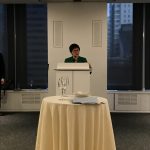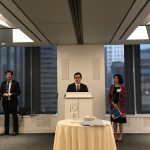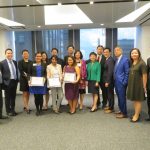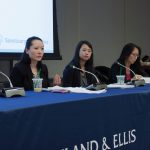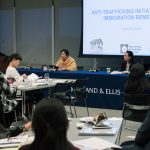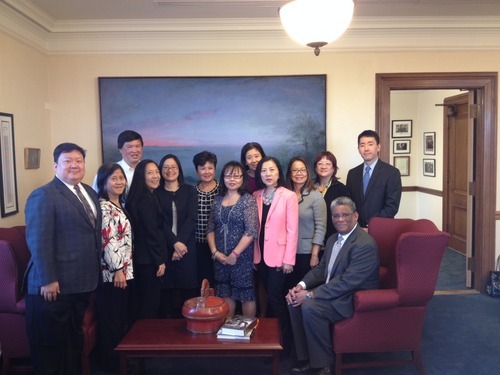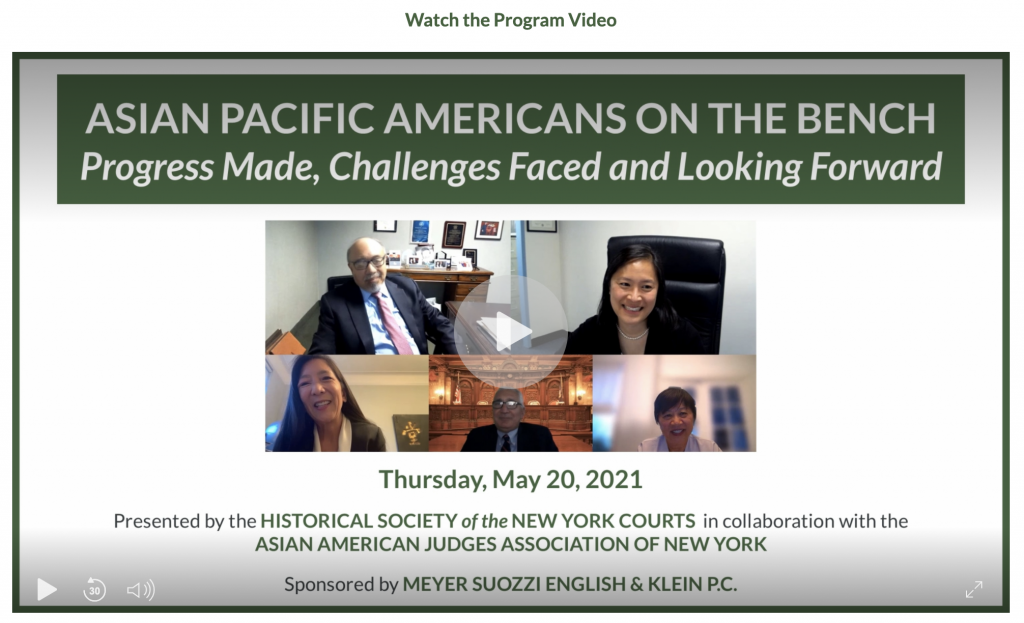
On May 20, the Historical Society of the New York Courts, the Asian American Judges Association of New York, and Meyer Suozzi English & Klein P.C. co-sponsored a panel discussion on the role of Asian Americans in the federal and state judiciary. The panelists of the event were Hon. Pamela K. Chen, U.S. District Judge for the Eastern District of New York and AABANY member; Hon. Toko Serita, New York State Acting Supreme Court Justice, Presiding Judge of the Queens Human Trafficking Intervention Court, and AABANY member; and Hon. Anil C. Singh, Associate Justice of the Appellate Division, First Department. Hon. Lillian Wan, New York State Acting Supreme Court Justice and AABANY member, moderated the panel.
New York State Court of Appeals Chief Judge Janet DiFiore opened the event with a few remarks, thanking the panelists and acknowledging their trailblazing careers as Asian-Americans. Chief Judge DiFiore also emphasized the importance of remembering AAPI history and the United States’ legacy of racial exclusion against Asians. She then turned the program over to Judge Randall T. Eng. Judge Eng, Of Counsel at Meyer Suozzi and former Presiding Justice of the Appellate Division, Second Department, welcomed the attendees and shared his experiences as the first Asian American appointed to the bench in New York.
Judge Wan then introduced the panelists for the event, opening the discussion with a brief presentation on AAPI history from Hong Yen Chang and the Chinese Exclusion Act to the present day. After the presentation, each of the panelists introduced themselves and shared their backgrounds and paths to becoming judges. Judge Wan began the panel discussion, asking the panelists about their experiences as Asian Americans at the times of their confirmations. Many of the panelists recounted how there were very few, if not any, Asian American judges when they were appointed. Judge Chen recalled how her appointment was facilitated by Obama’s attempts to diversify the federal bench, while Judge Serita recounted her experiences as the first Japanese American appointed to her court.
Judge Wan moved on to the reasons behind the underrepresentation of AAPIs in the state and federal judiciary. All of the panelists cited lack of political engagement, the lack of a pipeline, and the general tendency of Asian lawyers to seek employment at corporate law firms. Judge Chen also brought up cultural barriers, touching on how Asians tend not to promote themselves and do not seek help even when needed.
Judge Wan shifted the topic to Asian stereotypes and its effects on day-to-day legal practice. The judges all expressed how Asians are frequently lumped together, being viewed as a monolithic group. Judge Serita pointed out that the term “Asian” itself perpetuates invisibility, as it smothers the diverse experiences that individuals of different Asian cultures experience. Judge Chen also mentioned how women of color tend to face more microaggressions than men of color.
Judge Wan then asked the panelists if they had experienced any incidents of anti-Asian assault during the COVID pandemic. Judge Serita shared that during the height of the pandemic, she would wear a hat and sunglasses on the subway in order to hide her Asian identity. She also mentioned how women make up 70% of bias incident victims due to being stereotyped as meek and docile. Judge Serita also emphasized the importance of continuing the conversations about Asians and race in light of the rise in anti-Asian incidents. Judge Chen also shared a story, where an Asian female jury member had to be excused from jury duty because she feared being assaulted on the subway commute to the courthouse.
Judge Wan then directed the conversation towards the role of diversity in the judiciary. All the judges emphasized the importance of having a judiciary that reflects the diversity of the people it serves. Judge Chen also cited Supreme Court Associate Justice Sonia Sotomayor’s dissenting opinion in the Schuette v. Coalition case, pointing out how race does matter in the judiciary due to the long history of minorities being excluded in the United States.
Judge Wan then asked the panelists their thoughts on building a pipeline for Asians to enter the judiciary. All the judges expressed how important it was to reach out to the community to inspire young people to consider a public service career. Judge Chen identified a number of internships and programs for students aspiring to become judges while also noting how increasing Asian political representation in federal and state positions would afford aspiring AAPI lawyers the support needed to get through the confirmation process. Judge Chen also mentioned the role of bar associations like AABANY and the South Asian Bar Association of New York in sponsoring candidates for the bench. Judge Serita finished by encouraging young lawyers to be more proactive and to overcome Asian cultural humility.
Judge Wan moved to the topic of judicial screening panels, asking the judges their thoughts on the role of diversity on the panels. All the judges agreed on the vital role of diversity on screening panels. Judge Serita recounted one instance where an Asian woman being reviewed by the New York State Association of Criminal Defense Attorneys was given a low qualification score, due, in part, to the fact that only one out of the 30 committee members was Asian.
To close the panel, Judge Wan asked the judges if they had any advice to give to young attorneys aspiring to the bench. Judge Chen and Judge Serita both encouraged the attendees to enjoy their work, be passionate about it, but also, to not plan their careers rigidly around becoming a judge. All the judges also expressed the importance of flexibility and of keeping options open.
At the end of the event, Judge Eng shared photographs and a newspaper clipping documenting his long and distinguished career in the judiciary. Judge Wan then thanked the panelists for their time and the attendees for coming to the event.
To watch the full event, click here.



